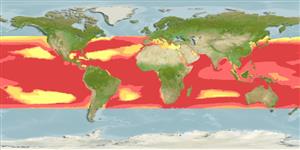Preferred temperature (Ref.
115969): 18.1 - 29.1, mean 27.4 (based on 5894 cells).
Phylogenetic diversity index (Ref.
82804): PD
50 = 1.0000 [Uniqueness, from 0.5 = low to 2.0 = high].
Bayesian length-weight: a=0.01349 (0.01052 - 0.01730), b=2.88 (2.80 - 2.96), in cm Total Length, based on LWR estimates for this species (Ref.
93245).
Mức dinh dưỡng (Ref.
69278): 4.4 ±0.0 se; based on diet studies.
Thích nghi nhanh (Ref.
120179): Chiêù cao, thời gian nhân đôi của chủng quần tối thiểu là dưới 15 tháng (K=0.4-1.2; tm<1; tmax=5; Fec=85,000).
Prior r = 1.09, 95% CL = 0.72 - 1.64, Based on 7 data-limited stock assessments.
Fishing Vulnerability (Ref.
59153): Moderate vulnerability (41 of 100).
Climate Vulnerability (Ref.
125649): High to very high vulnerability (70 of 100).
